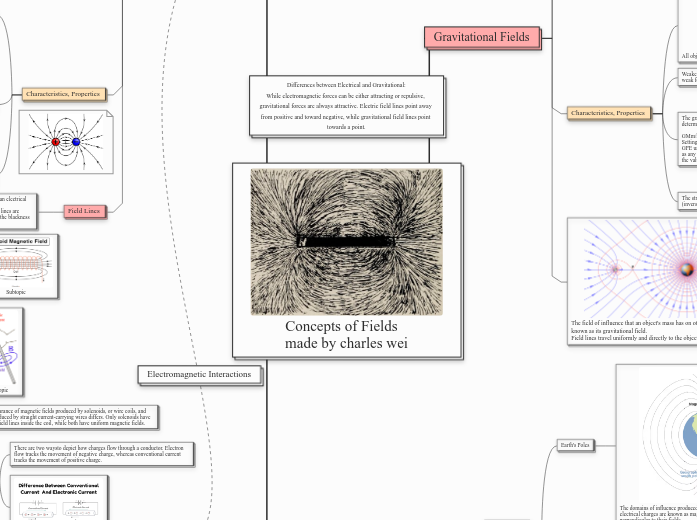Concepts of Fields
made by charles wei
Gravitational Fields
Applications
Orbits
When centripetal and gravitational forces are equal, things orbit larger objects. This results in circular motion and a orbiting satellite.
The earth is influenced by the moon's gravitational field as it revolves around it. The oceans' high and low tides are caused by the moon's gravity. Above is an equation of the required orbit velocity.
Gravitational Lens
Even light is impacted by the gravitational field strength of celestial objects with enough mass. Light is warped as it travels through these fields. By observing these distortions, researchers can investigate the origins of gravity and light distortion.
Gravitational Lensing
Force
Universal Gravitation (G = 6.67*10^-11N *m^2*s^-2)
Characteristics, Properties
All objects in the same magnetic field will experience the same acceleration.
Weakest of the four fundamental forces (The other three being strong force, weak force, electromagnetic force)
The gravitational potential energy of objects in a gravitational field is determined by their separation from the center of mass.
GMm/r is one way to express GPE.
Setting GPE to 0 on Earth's surface enables us to quantify an object's change in GPE using the equation ΔGPE = mgh, where h is the height above the ground, as any changes in altitude that we can access result in insignificant changes to the value of r.
Here is Earth's gravitational field. This is what accelerates us to the ground. As an object falls from a distance above the ground, potential energy converts to kinetic energy.
The stronger the non-contact force, the closer two objects are to one another (inverse square connection).
The field of influence that an object's mass has on other objects is known as its gravitational field.
Field lines travel uniformly and directly to the object's center.
Electrical Fields
Applications
Lightning
When storm cloud electric fields are powerful enough to overcome air resistance and release electricity, lightning happens. A pathfor the lightning strike is created when positive charges on the ground are drawn to negative charges in the cloud.
Capacitors
Capacitors are used by many deevices to store data.
An insulating material separates the two electrically conducting, oppositely charged plates that make up a capacitor. This allows energy to be stored in the capacitor for later transformation or use in another way.
Capacitors
Force
Colomb's Law (K = 8.99*10^9N*m^2*C^-2). Positive force = repulsive, negative force = attractive.
Electrical fields describe the impact a stationary charge has on other charges!
Dipoles
Describes two charges moving in a straight line with the opposite sign and equal magnitude. The field strength is zero directly between them.
Characteristics, Properties
Field Strength
A method for measuring the absolute electric interaction with varying charge units. calculates the force per unit charge, or the strength of a charge's field at any given location, based on a single charge.
Electrical Potential & Potential Energy
The potential energy of a system consisting of two charges spaced a certain distance apart is measured by electrical potential energy (force ⋅ distance). The energy per unit charge in that system is known as electrical potential, or voltage (energy / charge).
Potential Energy
Potential
The fields of various charges interact with one another. Vector sums can be used to find the field lines (acceleration) in overlapping fields at a specific position.
Field Lines
The force that a positive charge would encounter is the basis for an electrical field's field lines.
As a result, they indicate negativity rather than positivity. (Field lines are vector quantities that are unable to overlap. Either the density or the blackness of field lines indicate the field strength.)
Subtopic
Magnetic Fields
Force
Magnetic force on a charge that is in motion. Theta represents the angle between the magnetic field and the direction of velocity. Q is the magnitude of the charge, B is the magnetic field itself, and v is velocity.
Magnetic force on a current carrying conductor. θ represents the angle between the magnetic field and the current. B is the magnetic field itself, I is the current, and L is the length of the wire in the magnetic field.
Hand Rules
The right hand and left hand are used to show the conventional current/positive charges and electron flow/negative charges respectively.
If your thumb matches the direction of the current and your fingers are in the direction of the magnetic field lines, your middle finger should point towards the magnetic force direction.
Field Lines
All magnetic fields have field lines that ALWAYS travel out of north and towards south. In straight wires, field lines travel in a circular motion.
The domains of influence produced by shifting electric fields and moving electrical charges are known as magnetic fields. Electrical fields are perpendicular to their fields.
Applications
Earth's Poles
The domains of influence produced by shifting electric fields and moving electrical charges are known as magnetic fields. Electrical fields are perpendicular to their fields.
Mass Spectrometers
The composition of chemical substances can be determined using mass spectrometers. Atoms are subjected to an uniform magnetic field, accelerated to a constant speed, then ionized.
The mass of the ion can be obtained from the degree of deflection it undergoes, and the abundance of each atom with a distinct mass can be obtained through repeated experiments.
Characteristics, Properties
Straight Wire, Solenoid
Subtopic
Subtopic
The appearance of magnetic fields produced by solenoids, or wire coils, and those produced by straight current-carrying wires differs. Only solenoids have uniform field lines inside the coil, while both have uniform magnetic fields.
Conventional Current, Electron Current
There are two waysto depict how charges flow through a conductor. Electron flow tracks the movement of negative charge, whereas conventional current tracks the movement of positive charge.
Subtopic
